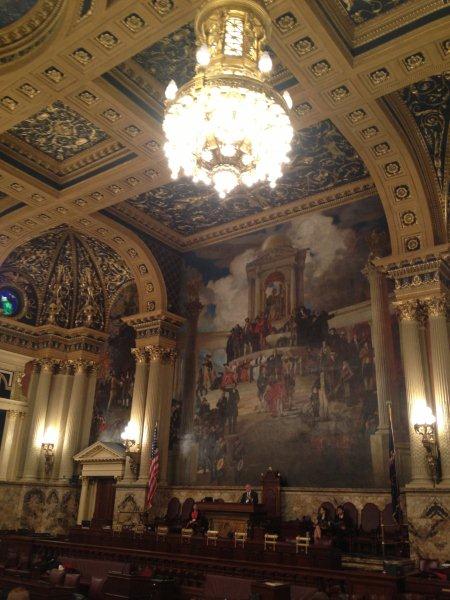Harrisburg: where the most influential lawmakers in Pennsylvania debate issues, propose bills, and pass laws; all for the good of the commonwealth. However walking into a Capital building conference room last Thursday one would be surprised to see, not district representatives, but high school students proposing different ideas and techniques in a highly heated discussion on improving current state education policies.
On Thursday, February 21st the PASC, Pennsylvania Association of Student Councils, held it’s annual “Student Summit on 21st Century Education” in the State Capital Building in Harrisburg. Schools from all over the state sent representatives from their respective student governments to participate in a daylong program where students simulated the legislative making process by discussing an issue, creating a bill, presenting it to the General Assembly (comprised of attendees), defending their proposal against other members of the general assembly, attempting to get enough votes to pass it, and then going back and revising their original proposal based on feedback they received from people outside of their committee.
North Penn Student Government members Katie Marino, Jonah Kim, Kokila Shankar, and Pat Zancolli traveled to Harrisburg to attend the PASC conference. They were a part of one of four committees. These committees discussed either Academic Accountability, Equitable School Funding, Teacher Evaluation & Professional Development, or Curricular & Co-Curricular Design in the Educational Process.
Although the topics may sounds bland, the conversation that each group had discussing ways to improve the Pennsylvania education policies was anything but. Entering one of the hundreds of rooms in the Capital building, one would find the students circled around a large table with iPads, laptops, notebooks and a large poster board where they mapped out statistical information they had gathered and the exact details they wanted to include in their policy.
There were two sessions to Thursday’s festivities. The morning session included the introduction to the day’s events as well as the separation into committees in the Pennsylvania State Capital General Assembly room. After that students went to their individual groups to construct the legislation that they would be presented to all PASC members later in the day. After the brief lunch break students returned to the Assembly room to present their pieces of legislation, debate them, and try to convince other PASC members to pass it. After the voting process each committees was set back to their rooms to make revisions to their proposals regardless of whether they were passed or not.
The Pennsylvania Association of Student Councils is directed by former North Penn teacher Mr. Jim Finnemeyer, who was very pleased with the outcome of Thursday’s events. “Today is a great opportunity for students to really take part in the legislative process and discuss different topics concerning Education issues in the state of Pennsylvania. And what better place to do it then right here in the beautiful Capital building in Harrisburg.”
Students took advantage of the opportunity to meet members from other Student Governments and share their opinions on education. “It’s cool to talk to kids from other schools and see what their school is like and why they think education should be a certain way. It gives you a broader understanding of what school is like for kids outside of your district.” Said North Penn SGA president Katie Marino, “Today was fun and I learned a lot. I got to hear a lot of cool things and meet other students who share an interest in education. It’s a really cool experience to take part in this process, especially in the state capital.”
With over 200 students participating in Thursday’s events, coming from schools as far as Pittsburgh all the way to Philadelphia, the day was an overall success. Two of the groups even gathered enough support from the General Assembly to pass their bill. The PASC hold events on a regular basis, but this one in particular is special since it is held in the State Capital, and is also the smallest. Regardless of whether the students had any desire to go into politics as a profession, Thursday’s events taught them skills and strategies that they will be able to use for the rest of their life.

